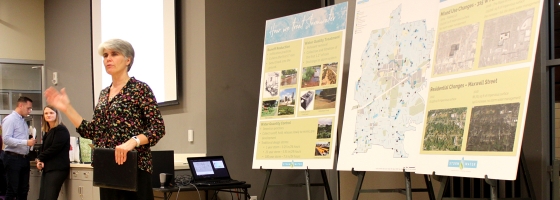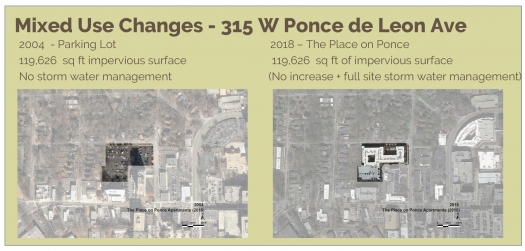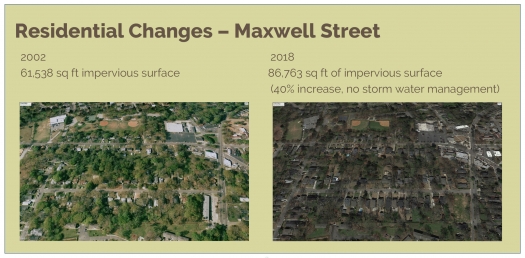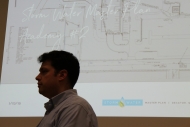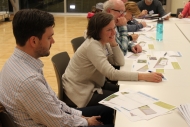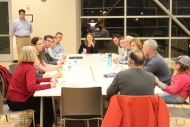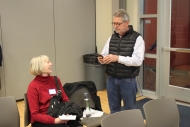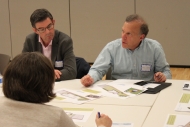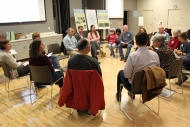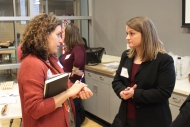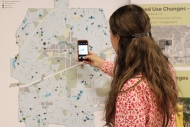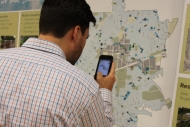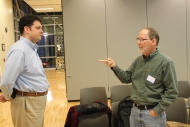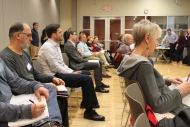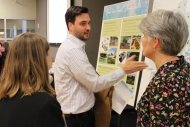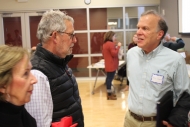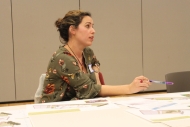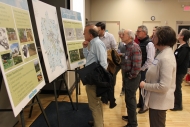As if to reinforce the point, heavy storms again rolled through Wednesday evening as an enthusiastic group of Decatur neighbors gathered at the Rec Center to discuss stormwater regulations.
Their collective input, in a nutshell: Give us options and clarity.
The meeting marked the second of the three Academy sessions drilling down on stormwater specifics as part of the Stormwater Master Plan updating process (PDF). In the first, residents explored real world challenges and approaches with a walking tour around Oakhurst. The third, scheduled to occur in May, will be dependent on the questions remaining unanswered at that time.
Along the way, residents have also been identifying stormwater trouble spots on the project’s online Wikimap. Contributions to-date were presented (PDF) on one of the evening’s display boards.
Consultant Kat McLeod Gurd brought attendees up to speed on the process thus far and set expectations for the road ahead before jumping into the regulatory discussions characterizing the bulk of the meeting.
The city’s approach to stormwater (contrasted with other Atlanta-area communities here) “impacts how we do development in Decatur,” noted Gurd, from mega projects to modest household renovations to landscaping. Ensuring such development limits impacts while, ideally, providing broader community benefit — in relation to both water quantity and quality — is the principal goal driving the conversation currently underway.
For example, much development has taken place downtown over the past two decades. Most has occurred on surface parking lots with little or no existing stormwater infrastructure in place. Because such redevelopment is now subjected to far more rigorous stormwater requirements than existed in the past, both quantity and quality performance have improved substantially with each project.
Contrast that with residential construction and renovation, typically exempt from substantive stormwater interventions, taking place in Decatur’s neighborhoods. On Oakhurst’s Maxwell Street, for example, impervious ground cover has increased by 40% over the past 16 years while no concurrent stormwater infrastructure or interventions have been required.
The result, of course, is less raw land to soak up the rain.
Downhill residents in multiple areas of the city seemed acutely aware of this fact as attendees discussed the challenges of their flooded yards and basements. Yet the conversation rarely ventured into talk of preventing homeowners from building on or otherwise beautifying their property. Instead, the focus was on what’s necessary to ensure that the negative consequences of one resident’s efforts aren’t borne by his or her neighbors.
The general conclusion? Rather than retaining the city’s current binary approach wherein residential efforts typically require no stormwater interventions until reaching the point where they require substantial and costly ones, new regulations should offer a menu of increasingly responsive approaches — from simple dry wells and rain gardens to green infrastructure such as permeable landscaping materials. That would ensure that construction otherwise compliant with Decatur’s development regulations would still exercise reasonable efforts to hold and absorb its own rainwater rather than sending it downhill to neighboring properties.
Moving the conversation to breakout groups, attendees considered how such a menu might work with a series of scenario diagrams (PDF) representing home construction and renovation at different levels of intensity.
Finally, attendees discussed the other side of the regulatory coin: the applicant-friendly nature of the process. While opinions and experiences varied in response to a sample process flowchart (PDF), one thing was consistent: residents want the new requirements to be clear and easy to navigate.
“Make it easy to do the right thing” was a common sentiment.
The evening concluded with worksheets (PDF) submitted by attendees so that the specifics of their input could be documented.
Next Steps
Further input opportunities will occur this Spring so save the dates:
General Input Meeting
Wednesday, May 1, 2019
Topic-Focused Academy Session
June date TBD
Until then, here’s a collection of images from the evening. See you in May!
![]()
Enter your address and we’ll email you whenever we post.

